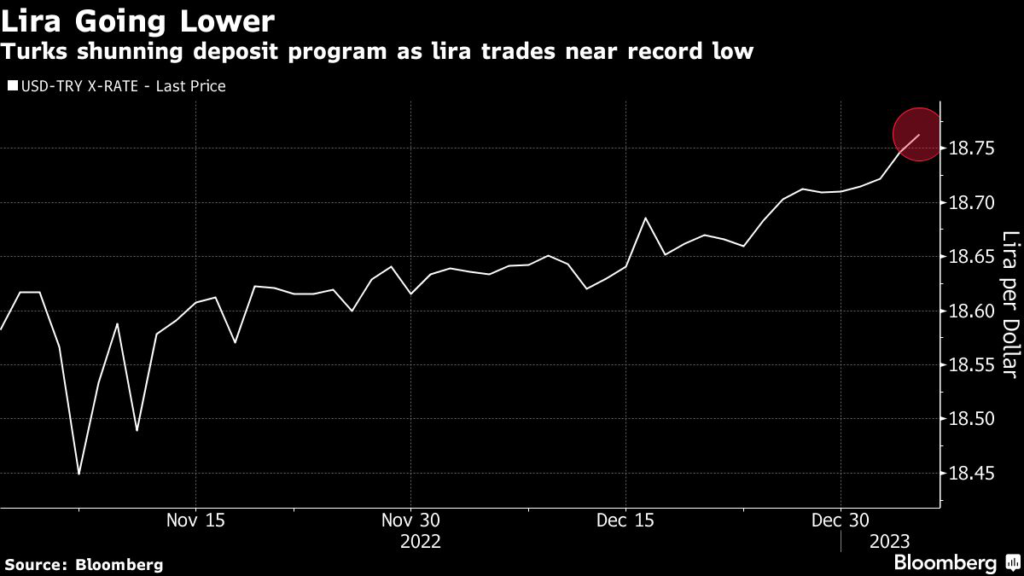Turkey’s central bank is pushing commercial lenders to sweeten the terms of an emergency savings scheme created to protect the lira as Turks increasingly pull cash from the program to seek higher returns elsewhere, according to people familiar with the discussions.
(Bloomberg) —
Turkey’s central bank is pushing commercial lenders to sweeten the terms of an emergency savings scheme created to protect the lira as Turks increasingly pull cash from the program to seek higher returns elsewhere, according to people familiar with the discussions.
The savings plan — which promises a state-guaranteed return on lira deposits that matches or beats any decline against the dollar — was introduced in the midst of a currency crisis late 2021. It became a key tool for the government to stabilize the lira after it lost almost 30% of its value in the space of a month.
But a run of interest-rate cuts, a comparatively flat exchange rate, and inflation around 65% have diminished the return the deposits offer, prompting savers to seek better earnings in stocks, hard currencies, gold and other investments. The deposit program had its biggest weekly net outflow on record in the period through Dec. 30, falling to its lowest level since September as almost $3 billion was pulled.
The fear now for the government is that the lira — already trading near a record low — could see fresh bouts of volatility as the support provided by the protected deposits wanes.
Officials from the central bank met with lenders’ representatives this week to convey their discontent over exits from the savings tool, according to the people, who asked not to be named because the meeting was private. At the meeting, the regulator also asked banks to offer better returns to customers who convert foreign currency holdings into lira in order to participate in the savings program.
A representative for the central bank declined to comment on the meeting when contacted by Bloomberg.
The lira “will be under pressure until after elections,” Istanbul Analytics economist Guldem Atabay said, referring to the presidential vote this summer. “FX protected deposits are no longer very attractive for investors amid low lira interest rates. In the search for value amid high inflation people prefer to invest in the stock exchange or seek alternatives such as returning to FX or even raising their consumption.”
Under the FX protected deposit scheme, savers can open accounts with lira they already hold or with foreign currency or gold that they can convert. If the lira depreciates by more than the interest rate on the account, the Turkish Treasury is responsible for paying the difference to the first group, and the central bank to the second. The program has cost the Treasury nearly $5 billion, according to Treasury and Finance Minister Nureddin Nebati.
What Bloomberg Economics Says…
“The relative stability in the lira means the return on FX-protected deposits are capped by a function of the central bank policy rate, which has been falling. The large exodus from the scheme may continue as savers seek higher returns from alternative investments, including the stock market, gold, or even regular lira-deposits.”
— Selva Bahar Baziki, economist. Click here to read more.
The move follows new regulations from the central bank last month that banned lenders from using derivatives and options that eventually allow lira deposits to create new demands for foreign currency.
Even with 1.42 trillion liras ($75.5 billion) still held in the savings program as of Dec. 30, the Turkish currency was among the worst performers in emerging markets last year. The lira extended its slide to a record low on Thursday, sinking as much as 0.2% to 18.7868 versus the greenback.
Read More: Turks Shun State-Backed Deposits That Helped Stop Lira Rout
–With assistance from Patrick Sykes.
(Updates with new details from third paragrpah, new chart.)
More stories like this are available on bloomberg.com
©2023 Bloomberg L.P.










